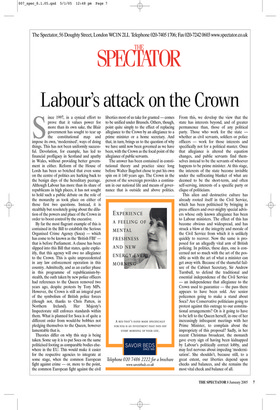Labour’s attack on the Crown
Since 1997, in a cynical effort to prove that it values power for more than its own sake, the Blair government has sought to tear up the constitutional map and impose its own, ‘modernised’, ways of doing things. This has not been uniformly successful. Devolution, for example, has led to financial profligacy in Scotland and apathy in Wales, without providing better government in either. Reform of the House of Lords has been so botched that even some on the centre of politics are harking back to the benign days of the hereditary peerage. Although Labour has more than its share of republicans in high places, it has not sought to hold such a public debate on the role of the monarchy as took place on either of those first two questions. Instead, it is stealthily but resolutely going about the dilution of the powers and place of the Crown in order to boost control by the executive.
By far the most flagrant example of this is contained in the Bill to establish the Serious Organised Crime Agency (Soca) — which has come to be known as the ‘British FBI’ that is before Parliament. A clause has been slipped into this Bill that states, quite explicitly, that this agency will owe no allegiance to the Crown. This is quite unprecedented in any law enforcement operation in this country. Admittedly, and as an earlier phase in this programme of republicanism-bystealth, the oath taken by new police officers had references to the Queen removed two years ago, despite protests by Tory MPs. However, the Crown is still an integral part of the symbolism of British police forces (though not, thanks to Chris Patten, in Northern Ireland). Her Majesty’s Inspectorate still enforces standards within them. What is planned for Soca is of quite a different order from would-be bobbies not pledging themselves to the Queen, however lamentable that is.
Theories differ on why this step is being taken. Some say it is to put Soca on the same politicised footing as comparable bodies elsewhere in the EU. This would make it easier for the respective agencies to integrate at some stage, when the common European fight against crime — or, more to the point, the common European fight against the civil liberties most of us take for granted — comes to be unified under Brussels. Others, though, point quite simply to the effect of replacing allegiance to the Crown by an allegiance to a prime minister or a home secretary. And that, in turn, brings us to the question of why we have until now been governed as we have been, with the Crown as the focal point of the allegiance of public servants.
The answer has been contained in constitutional theory and practice since long before Walter Bagehot chose to put his own spin on it 140 years ago. The Crown in the person of the sovereign provides a continuum in our national life and means of governance that is outside and above politics. From this, we develop the view that the state has interests beyond, and of greater permanence than, those of any political party. Those who work for the state whether as civil servants, soldiers or police officers — work for those interests and specifically not for a political master. Once that allegiance is altered the equation changes, and public servants find themselves instead to be the servants of whoever happens to be prime minister. At this stage, the interests of the state become invisible under the suffocating blanket of what are deemed to be the short-term, and often self-serving, interests of a specific party or clique of politicians.
This alien and destructive culture has already rooted itself in the Civil Service, which has been politicised by bringing in press officers and over-mighty special advisers whose only known allegiance has been to Labour ministers. The effect of this has become obvious and widespread, and has struck a blow at the integrity and morale of the Civil Service from which it is unlikely quickly to recover. Now the same is proposed for an allegedly vital arm of British policing. In politics, these days, one is concerned not so much with the art of the possible as with the art of what a minister can get away with. Because of the shameful failure of the Cabinet Secretary, Sir Andrew Turnbull, to defend the traditional and essential independence of the Civil Service — an independence that allegiance to the Crown used to guarantee — the pass there appears to have been sold. Are senior policemen going to make a stand about Soca? Are Conservative politicians going to protest against this outrage to our constitutional arrangements? Or is it going to have to be left to the Queen herself, in one of her increasingly infrequent meetings with her Prime Minister, to complain about the impropriety of this proposal? Sadly, in her recent Christmas broadcast, the monarch gave every sign of having been kidnapped by Labour’s politically correct lobby, and may feel nervous about impeding ‘modernisation’. She shouldn’t, because still, to a great extent, our liberties depend upon checks and balances, and she remains the most vital check and balance of all.










































 Previous page
Previous page